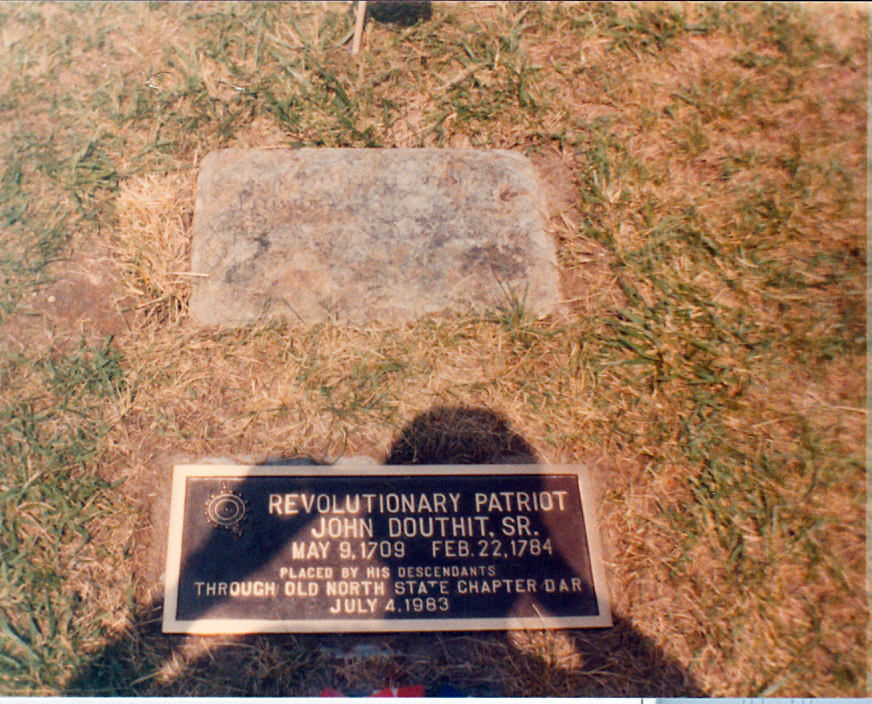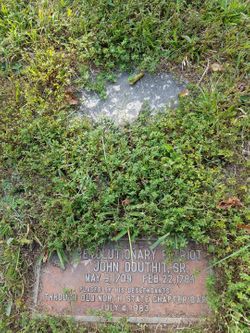John DOUTHET/DOUTHIT Sr
SAR Patriot #:
P-149750
The following information was assembled from numerous sources and cannot be used directly as proof of Qualifying Service or Lineage.
It is considered a research aid and is intended to assist in locating sources that can be used as proof.
State of Service: NC
Qualifying Service: Patriotic Service
DAR #: A033870
Birth: 09 May 1709 Coleraine / Londonderry / Northern Ireland
Death: 22 Feb 1784 / Rowan / NC
Qualifying Service Description:
Furnished supplies to the militia
Additional References:
- DAR cites:
- NC Rev Army Accts, Vol 6, Book 25, pg 23, Roll #54.5 & 6
- Accts of the US with NC, Rev War BK A, pg 172, #5317, Roll # 53, S.115.45
Spouse: Mary Elizabeth Hope Scott
Children: Sarah; William; Isaac; Elizabeth; Abraham; John; James;
Members Who Share This Ancestor
| Date Approved | Society | ACN | SAR Member Info | Lineage via Child | View Application Detail | |
|---|---|---|---|---|---|---|
| 1953-03-05 | MS | Unassigned | Robert Edward Torbert (75920) | John | ||
| 1980-08-06 | IN | Unassigned | Roland Lee Schinbeckler (117310) | James | ||
| 1983-05-05 | MO | Unassigned | William L Wood (112619) | Sarah | ||
| 1985-03-21 | MO | Unassigned | Robert Nelson Clark (124328) | Sarah | ||
| 1985-03-28 | IN | 227663 | Harold Henry Douthit (127459) | Abraham | ||
| 1999-02-08 | TX | 2504 | Delbert Lawrence Taylor (128153) | Sarah | ||
| 2000-11-20 | NC | 7912 | Harold Richard Bass (154767) | Isaac | ||
| 2003-08-27 | CO | 16662 | James Robert Miles (160921) | William | ||
| 2003-08-27 | CO | 16663 | Chad Ryan Miles (160922) | William | ||
| 2004-04-28 | NC | 17198 | Frederick Monroe Waters Jr. (157420) | Sarah | ||
| 2004-09-15 | ME | 20587 | Jay Delwin Miles (163311) | William | ||
| 2005-12-08 | NM | 24433 | Ryan James Grabowski (166134) | Elisabeth/Elizabeth | ||
| 2015-01-23 | OH | 61746 | Larry Wayne Collins (170584) | Elizabeth | ||
| 2016-11-15 | CA | 71933 | Donald William Kidd (200443) | Abraham | ||
| 2016-11-15 | CA | 71934 | Andrew William Kidd (200444) | Abraham | ||
| 2020-10-23 | NC | 94408 | Jason Douthit Reed (217318) | John | ||
| 2020-10-23 | NC | 94409 | Davis Taylor Reed (217319) | John | ||
| 2020-10-23 | NC | 94410 | Connor Finley Reed (217320) | John | ||
| 2023-08-11 | FL | 108550 | Gary Wayne Lavender (227470) | John | ||
| 2023-12-01 | AZ | 109869 | Robert Tedford Naeckel (228507) | William | ||
| 2024-04-26 | NC | 111522 | Russell Ogburn Pratt Jr. (229839) | James |
Burial:
Location:
Clemmons / Forsyth / NC / USA
Find A Grave Cemetery #:
Marker Type:
DAR
SAR Grave Dedication Date:
04 Jul 1983
Comments:
- Horizontal stone, Flat in ground
- Image # 1, provide by unknown contributor
- Image # 2, provided with permission from A. Schrenk, Find-A-Grave member # 47008830
Directions to Cemetery / Gravesite:
The cemetery has wooden fence posts around it. The graves are Moravian, so they're all the same, simple stones. This makes the cemetery hard to find as it's hard to see from the road. It's located 500 feet north of the end of Copeland Road, just north of the intersection with US 158
Additional Information:
DAR cites; PATRIOT'S SON, JOHN JR A033880, MARRIED ELEANOR DAVIS. NO PROOF THAT HER FIRST NAME WAS MARY.

